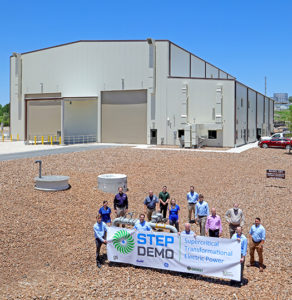A STEP closer to transformational electric power Construction complete on building to house next-generation electric power pilot plant enabled by supercritical carbon dioxide technology
July 1, 2020
Des Plaines, IL
The STEP Demo team is pleased to announce that it has received the Certificate of Occupancy for the new Southwest Research Institute (SwRI) building in San Antonio that will house the 10-megawatt Supercritical Transformational Electric Power (STEP) pilot plant. The pilot plant will demonstrate a fully integrated electricity-generating power plant that uses supercritical carbon dioxide (sCO2) to dramatically improve size, efficiency, economics, operational flexibility, space requirements and environmental performance of this new technology.
GTI, in collaboration with SwRI and GE Research, is leading the STEP Demo project with funding from the U.S. Department of Energy/National Energy Technology Laboratory (U.S. DOE/NETL) and numerous other industry partners.
The team has designed the pilot-scale power plant, which will be among the largest demonstration facilities for sCO2 technology in the world. Construction on the building is complete, and component manufacturing and equipment installation is progressing, followed by commissioning and start-up slated for early next year. After commissioning, comprehensive testing will mitigate risks in the advancement of sCO2 technology components and demonstrate performance over a range of operating conditions, illustrating the operability and performance of this high-efficiency power cycle.
“This milestone marks the beginning of a potentially revolutionary development in the energy industry,” said SwRI President and CEO Adam L. Hamilton, P.E. “It’s exciting to have this game-changing STEP pilot plant located on the SwRI campus, where new technology developed right here in Texas will change the way we think about electric power generation.”
The transformational technology utilizes high-pressure CO2 instead of steam in a closed power cycle and is a breakthrough solution for clean, lower-cost electric power technology with a smaller footprint, higher efficiency, reduced water usage and lower CO2 emissions. It will help the state of Texas improve air quality and use abundant natural gas energy resources. However, the technology can also use industrial waste heat, concentrating solar power or practically any other heat input to generate electricity.
State Senator José Menéndez, D-San Antonio, has been a staunch supporter of the project, and provided valuable assistance with garnering state co-funding for this important project showcasing Texas as a U.S. and global energy technology leader. Innovative projects such as the STEP Demo look to the future while creating local jobs and attracting scientists and engineers from around the globe.
The project offers enhanced research and education opportunities for the next generation of energy professionals, and the team is excited to have the University of Houston (UH) as an academic partner. With a grant from the Texas Commission of Environmental Quality (TCEQ), UH will evaluate project data, quantify reduced emissions and improved efficiencies, and provide assessments to assist TCEQ in reducing air pollutants and achieving attainment with federal air quality standards.
The STEP Demo facility is expected to attract additional investment now and in the long term. With a flexible design, it can be reconfigured to accommodate new efforts so it will remain a testbed for future sCO2-cycle-based power system and component development.
OEMs, engineering companies, and power plant owner/operators from around the world are invited to join this project to gain a better understanding of how sCO2 technology can improve high-efficiency power generation.
See more photos of the building.
About National Energy Technology Laboratory (NETL)
The National Energy Technology Laboratory (NETL) is the U.S. Department of Energy’s (DOE) only Government-Owned, Government-Operated (GOGO) Laboratory. NETL focuses on the discovery, development, and deployment of technology solutions to enhance the nation’s energy foundation and protect the environment for future generations. These advanced technologies enable fossil fuels to produce the clean, reliable, and affordable energy needed to support increased domestic manufacturing, improve infrastructure, enhance global competitiveness, revitalize the workforce, and free the U.S. from dependence on foreign oil.
About GTI
GTI is a leading nonprofit research, development and training organization that has been addressing global energy and environmental challenges by developing technology-based solutions for consumers, industry, and government for nearly 80 years. GTI leads the STEP Demo project as the prime contractor with the U.S. Department of Energy/National Energy Technology Laboratory (DOE/NETL).
About SwRI
Southwest Research Institute is a premier independent, nonprofit research and development organization using multidisciplinary services to provide solutions to some of the world’s most challenging scientific and engineering problems. Headquartered in San Antonio, Texas, SwRI occupies more than 1,500 acres, providing over 2.3 million square feet of laboratories, test facilities, workshops, and offices for approximately 3,000 employees who perform contract work for government and industry clients.
About GE Research
GE Research is GE’s innovation powerhouse where research meets reality. It is a world-class team of 1,000+ scientific, engineering and marketing minds (600+ Ph. Ds), working at the intersection of physics and markets, physical and digital technologies, and across a broad set of industries to deliver world-changing innovations and capabilities for their customers.
Become a project partner
This open project is welcoming new partners from around the world. OEMs, engineering companies, and power plant owner/operators are invited to join to gain a better understanding of how sCO2 technology can improve high-efficiency power generation.

For more information, contact Markus Lesemann directly.


